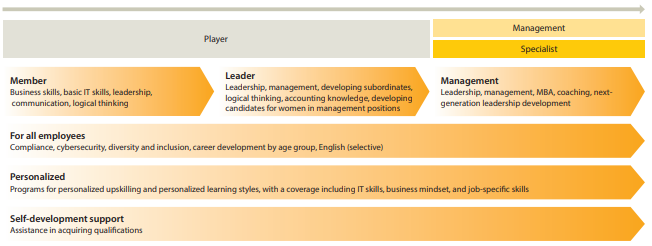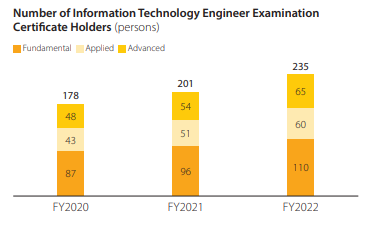Human Resource Development
Policy on Human Resources Development
In order for the Group to grow sustainably, it is essential to increase abilities of each and every employee and support their growth to maximize the organizational capabilities. In other words, we believe that the human resources strategy is our management strategy itself. In particular, we position developing next-generation leaders who will lead our management and business as an important theme in our human resources strategy.
Advanced IT Human Resources
Based on the belief that the use of advanced and cutting-edge IT technology is the source of our business, we invest in our IT technicians to acquire advanced and cutting-edge skills and to accelerate the realization of our business strategy. To be specific, in the engineer training, new graduates learn basic knowledge of IT infrastructure and development technologies, and learn technologies related to system development, networking, security, and other infrastructure in a hands-on manner through development exercises and other activities.
Our aim is to create a positive cycle whereby improving expertise and providing opportunities commensurate with their expertise gives employees a greater incentive to work productively and contribute to the organization’s success, and whereby accurate evaluation of employees’ contributions further motivates employees to pursue growth.
Qualification Reward System and Support for Acquiring Qualification
In line with the changes in the times, including the speed of technological innovation, changes in individuals’ lifestyles, and career diversification, in addition to group training, we are strengthening the development of individual skills and abilities.
We encourage employees to obtain qualifications by covering the costs of obtaining and maintaining qualifications and paying monetary rewards for doing so. Eligible qualifications include vendor certifications in areas such as network security, servers, databases, and cloud computing, public IT qualifications such as Information Technology Engineer and Registered Information Security Specialist, DX promotion-related qualifications in AI, statistics, and the like, and other qualifications necessary for business operations.
To support employees’ language skills, we conduct English language training that takes TOEIC exam preparation into account. We are also responding to the diversity of our workforce by offering non-Japanese employees assistance to take Japanese language classes.
As other self-improvement initiatives, we promote the development of expertise and individual skills in all employees by subsidizing the costs of external online training and in-person courses and paying monetary rewards when they obtain company-recommended qualifications.
Training system

■Training for new graduates
For new graduate employees, as pre-employment training, the Company provides support for self-improvement through e-learning targeting students who have received employment offers from the Company and the acquisition of qualifications at the Company’s expense. After they have joined the Company, as a transition period from student to working member of society, the new graduates begin with off-the-job training (OFF-JT), which is designed to give them a deeper understanding of the Company’s corporate culture and work processes as a whole, as well as equip them with basic business skills and IT skills.
Subsequently, they will be nurtured through on-the-job training (OJT) conducted by supervisors and trainers in the departments to which they are assigned. This is in addition to a year-long on-boarding process conducted by the Human Resources Department, which employs such means as questionnaires and interviews. In these ways, we provide an environment in which new graduates can work with peace of mind.
■Personalized training
In FY2024, we began offering a system of personalized training in which we allocate each employee, regardless of job role, a fixed training allowance that the employee can use to obtain knowledge, skills, or qualifications relevant to their job.
We have a corporate culture that emphasizes active learning on the job. With career autonomy becoming increasingly important these days, we create learning opportunities to encouraging employees to think independently about their career and take active steps in pursuit of their career aspirations.
■Training for career development
We supports each employee in proactiviely shaping their career by implementing initiatives such as "career discussions with supervisors,""age-specific career training,"and"meeintgs with career consultants"to help them achieve the career they aspire to.
In the"career discussions eith supervisors,"emplyees create a mid-to long-term career plan once a a year and a have the opportunity to engage in dialogue with their supervisors to foster mutual understanding.Through "age-specific career training"and"meeings with career consultants,"emolyees are aeuncouraged to consider the life events and work-life balance typical of their generation,as well as their own values,to envision the person they want to become,learn how to plan their careers,and organize their thoughts and actions to achieve their goals.
We have also set up a Career Challenge System, which enables employees to forge their own career path independently. This program allows employees who have requested a transfer to make that happen by passing a selection process (document screening and interview). In this way, the Company helps employees who want to take on new challenges.
■Evaluation system
In the Company’s evaluation system, employees are assessed using two main criteria. One is a performance evaluation, which assesses their achievement of organizational and individual performance targets and individual growth targets. The other is job aptitude evaluation, in which they are evaluated based on their fulfillment of the expected roles for each grade. The results of these evaluations provide the basis for the determination of employees’ treatment (salary, bonus, and grade). In addition, the roles and evaluation criteria expected at each manager and supervisor grade (management: three grades, specialist: three grades) and general employee grade (player: four grades) have been codified, and a fair and satisfactory compensation system has been realized. For medium- to long-term growth, the evaluation items are set with an emphasis on contribution to the entire organization, such as identifying issues, planning, leveraging expertise, and improving operations, and human resource development, such as nurturing of team members and successors.
In addition to twice-yearly evaluation feedback interviews with their supervisor, employees take part in goal-setting interviews and regular one-on-one interviews, as part of our efforts to support each individual employee to achieve their goals and growth. After the feedback interview about their evaluation results, the evaluated employees are asked to complete a questionnaire to help improve the quality of the interview process. Evaluators (managers) are also given training by external instructors, as well as training by the Human Resources Department regarding feedback and target management.

